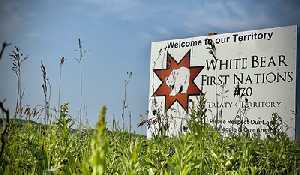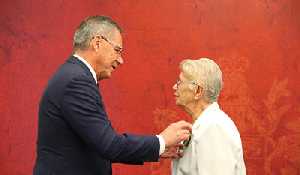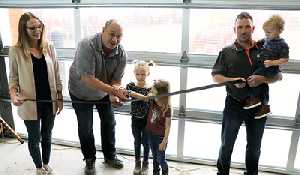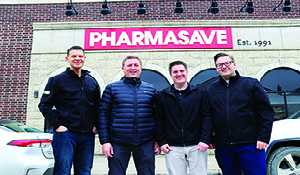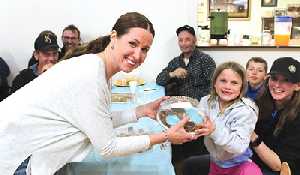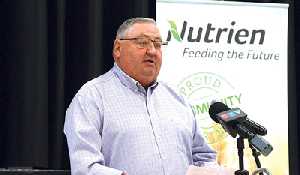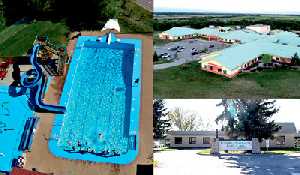Two local women part of Touchdown for Dreams
October 25, 2021, 2:26 pm
Kevin Weedmark
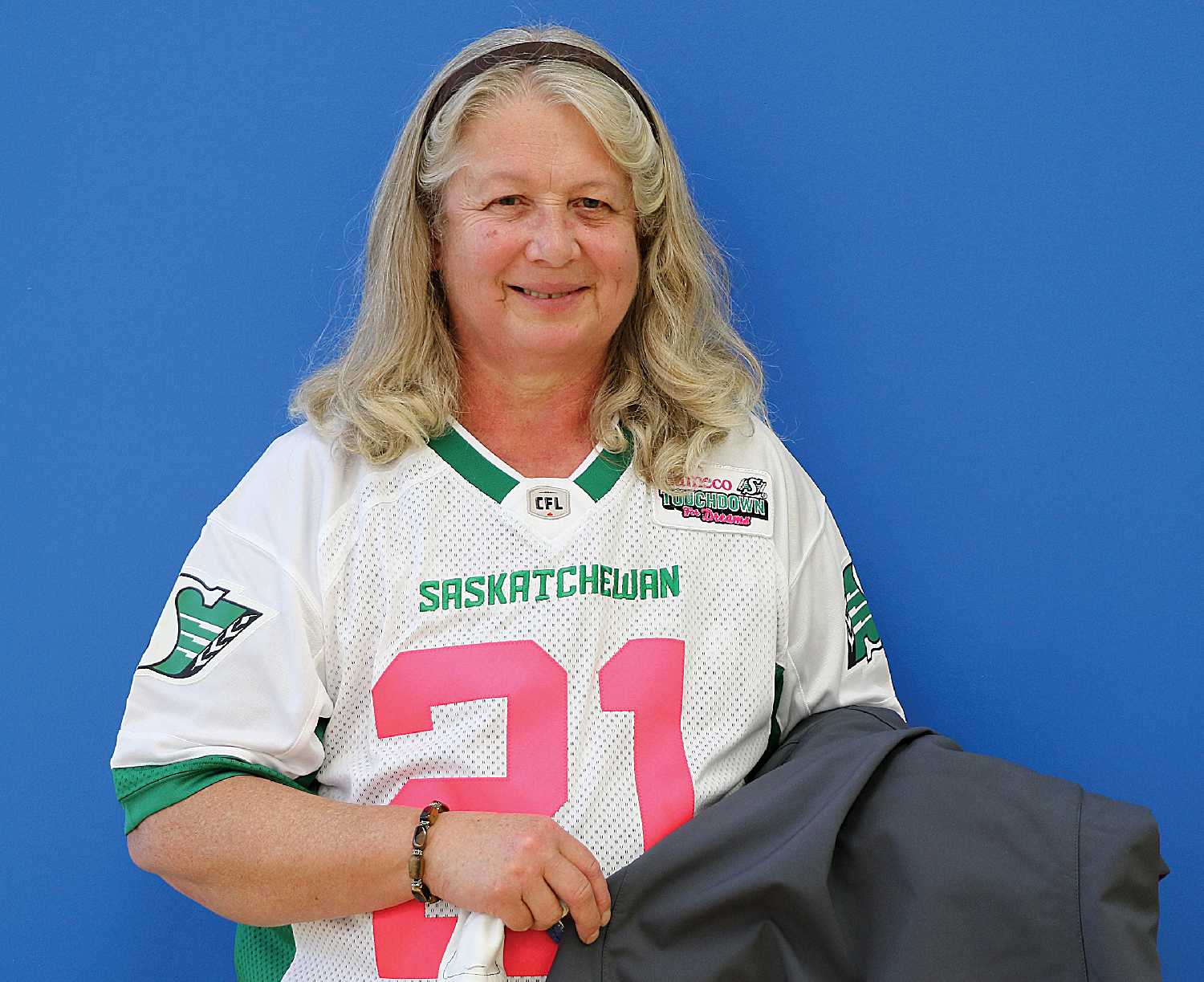

Two local women—Cindy Blondeau and Sheila Heide, both of Moosomin—were among the 10 Saskatchewan women selected to be part of the Cameco Touchdown for Dreams this year.
Touchdown for Dreams accepts applications from women across the province who have a terminal cancer diagnosis, and helps them fulfil a personal dream.
Nora Yeates, CEO of the Cancer Foundation of Saskatchewan told the World-Spectator she was inspired by meeting the women selected for the program.
“This is the first year where I’ve been able to meet all the women, go to the event, and I will tell you it is absolutely incredible,” she said. “It’s incredibly sad but it’s incredibly inspiring at the same time. These women are so happy and so positive and so open. I’m very privileged to be able to meet these women. They inspire me to do what I do everyday and I know they inspire each other. I feel truly blessed to be able to be a part of this program.”
Cindy Blondeau
Cindy Blondeau says she has applied for the program before, and was excited to be chosen this year.
“I’ve known about it since they started it and I applied for it every year. It was about time to get my rejection letter this year and instead I got a phone call.
“I applied to update my kitchen. When we built the house we never put a gas line into the kitchen and I’ve always wanted a gas stove. So that’s my dream—to get that gas line plumbed in and get myself a gas stove.
“It feels great to be selected. It’s wonderful, it’s just been really exciting.”
She said Cameco and the Cancer Foundation put on a great weekend in Regina, bringing the women together for the weekend, including the Riders’ pink game.
“We had a great weekend in Regina. We had a supper for everyone selected this year, and some of the people who were selected earlier years were there, too.
“The proceeds from the Riders’ pink game has always gone to this. It’s always been a collaboration with the Riders and Cameco. Whatever they sell every year at the pink game—last year it was toques, this year it was the neck warmers—the proceeds from that always go to Touchdown for Dreams. It stays in the province, it stays for women with late stage cancers of any sort and this year there were 10 recipients and they were all stage 4.”
Blondeau says she has had a long journey with cancer.
“It’s been a long time. It will be 10 years in February since I was diagnosed but I wasn’t scanned and found out that I was stage 4 until the next June. It was June of 2012 that they said it was everywhere in my bones, stage 4. I responded really well to some of the first treatments—that’s why I’m still here—but it’s progressed a few times since then so I’ve been getting into the chemos now.
“In my case they did surgery right away. There are hormone receptors that are connected to breast cancer and I happen to have two of them, I don’t have the third one but I do have two. So they put you on an anti-hormonal drug to start with. It’s the least complicated one to start with to see if it works. I responded really well to that for the first five years. So it held it stable. It doesn’t cure anything, but it holds it stable.
“It didn’t go anywhere but my bones and the spot in my liver that I’ve had all along. It just stayed that way but then eventually it starts to move. So then it didn’t work anymore so then we’ve done a couple different chemos since then. I have had some radiation just for pain management. So now I’ve been on a couple different chemos and the last one I’ve been on for the last two years and I’m responding really well to it, but I can’t handle the side effects, they start to build up and it gets toxic. So we’ve been reducing the dose and right now I’m on a chemo break and we’ll scan again at the end of the month. I go every three months for scans and if it has progressed again or it doesn’t look good, then we go to some of the heavier duty intrusion chemos. So far I’ve only had to do the oral. So that’s been nice but the side effects are pretty tough.”
Blondeau says that living with cancer means always looking to the next appointment or the next treatment.
“There’s always some appointment to keep in mind that is coming or you’re dealing with some side effect or you’re dealing with some effect from the chemo itself. So it never goes away, you never really forget about it. I’ve been really fortunate that I’ve had a fairly normal life. I function mostly pretty good but you never forget about it, it’s always there and you’re always so heartbroken when somebody else gets diagnosed. I’ve had so many friends that have been diagnosed and moved on to stage 4 with breast cancer and are no longer with us. That’s always hard to watch somebody else go through it and then not be there.”
Blondeau says it was good to be able to meet with the other recipients.
“Once you’re a recipient of this program, you’re always involved in the program, so we met some of the ladies from previous years at the dinner and the game, so you talk to them and learn about their journey. The stage 4 breast cancer women in Saskatchewan are a pretty tight little group. I met one lady there who actually has broken the record, she’s the oldest recipient they’ve ever had, she’s 78. I’ve met her before, so that was really nice. It’s really good to talk to them, because nobody else gets it like those ladies, they’re the ones that understand right off the bat. It’s just really validating to meet the ones that know what you’re going through.”
Which is the more important part of being a recipient for Blondeau—having the funds to make her kitchen the way she wants it or meeting the other recipients to share stories?
“The best part of it might be that you’re always there now. You’re always going to be a part of that Cameco crowd now. Getting my kitchen’s pretty good though—I always wanted that gas stove. So it’s both really. And Cameco, they just can’t do enough for you. They really get into this program. The volunteers that sell the merchandise at the game are Cameco volunteers and they said it’s like a lottery, like you can’t take all of them that volunteer. They fly them down for the day from the various work sites and train them to do the selling. They fly them back, they’re only there for a day but he said they turn volunteers away regularly. We were in a private box to watch the game and a lot of the volunteers were there too, handing out drinks, making sure you were taken care of.”
How important does she think it is that there are programs like this out there?
“Oh it’s huge. Nobody realizes it’s a different world once you wind up stage 4 and you know you’re terminal. So to have something’s that’s meant for you makes a difference, it is nice. It was nice to meet the ladies and now we can always stay in touch, always keep track of each other’s stories. It is, it’s morale boosting, it is, it really is.”
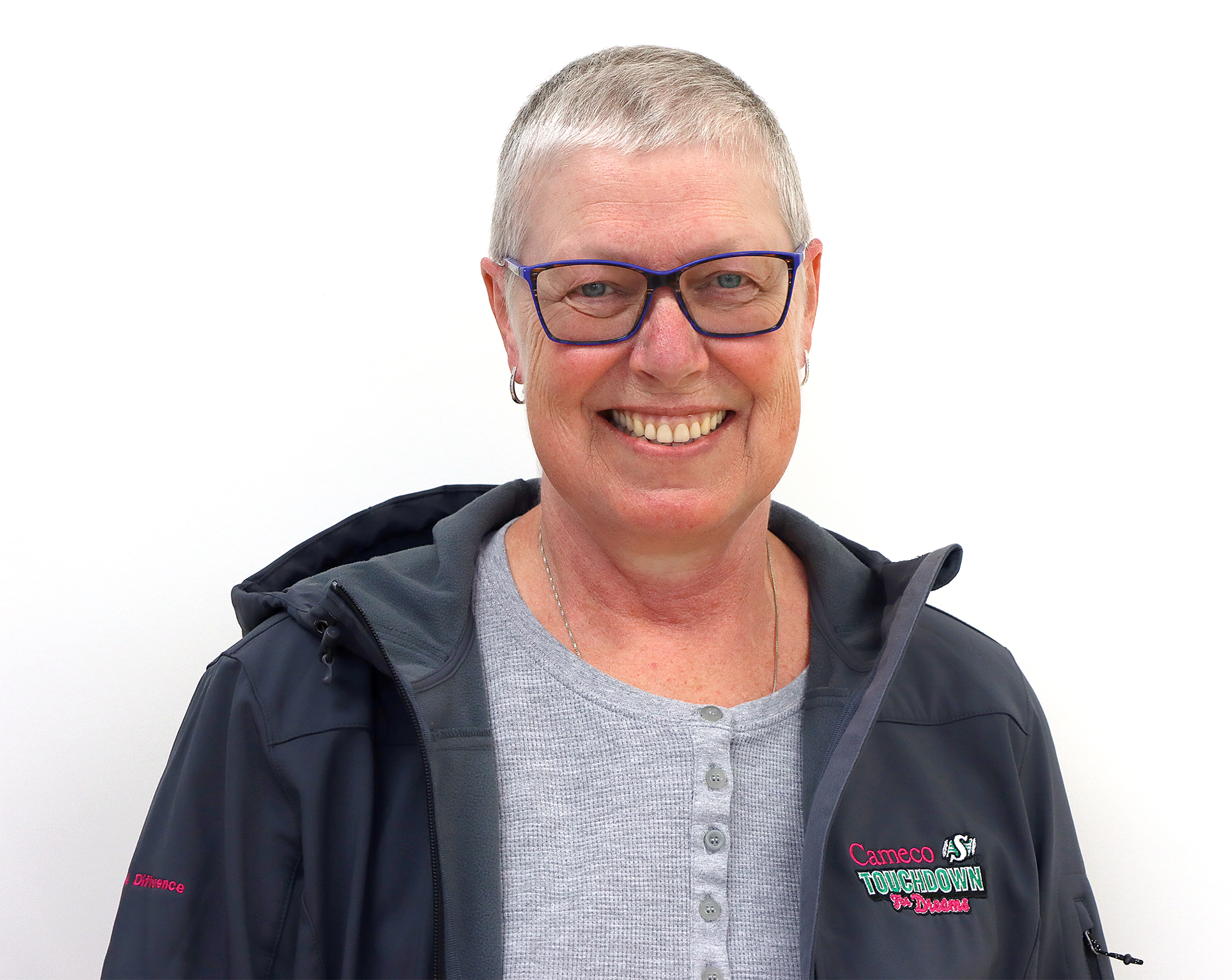

Sheila Heide
Sheila Heide applied for the program for the first time this year, and has a unique dream she wants to see become reality.
“I’ve been on chemo for three and a half years now,” she says. “I’d often seen the signs for Touchdown for Dreams when I was having chemo but I’d always miss the deadline. This year it popped up and I thought, hey why not? I saw it and the deadline was the next day so I really didn’t have a whole lot of time to think about it, I just sent in my application.”
What was the dream she applied for?
“My dream was always to go to Italy and experience one of those large al fresco feasts in the open air, but with Covid-19 restrictions and always being on chemo, that reality is very unlikely to happen. So my dream is to bring that big Italian feast to us, so then we can share it with friends and family. It’s even better actually than travelling. We might not have the same ambience as being in Italy, but we will be with family and friends.”
Cameco will work out the details of the dinner.
“I have no idea at this point what the details will be. We’ve had some initial discussions, but because it’s a summer thing, it will be next year.
“I envision this long table with nice tableware and vases of flowers, candles maybe. My vision is the way I see it in movies—the chairs don’t match and it’s just whatever gets thrown together but it’s more the music and the joy and the laughter. And of course Italian food is fantastic.
“I think that was maybe part of the reason why I was accepted, because it was such a different, odd request. It wasn’t the usual things, it’s less tangible, it’s a meal but it’s also the sharing of the experience.
“I read a book 10 or 12 years ago all about learning just to let go. The author of the book and his wife actually started up these retreats in Italy. You’d do yoga, you’d do different internal healing modalities or whatever, but then they always talked about the food and all that too. Then they branched out and started having them on Stromboli island and various other places. That was always one of my goals that I would have liked to have done that, and I think that’s where the whole Italian feast thing started in my mind, because I’m sure in some of their ads they were showing people sitting out on a terrace at their table. So that’s kind of what really drew me to Italy and wanting to have that experience.”
How long has she been battling cancer?
“Well it’ll be four years in March. I was diagnosed immediately with stage four colon cancer. I just had to switch chemos again. I’m now on the third and final line unless there’s a trial drug out there. So fingers crossed this one will help. It spread to my liver, lymph nodes, lungs, so it’s all over but I’m here, I’m functioning. You just go through it.”
She says living with cancer means continual rounds of treatments.
“I did have a break this summer for eight weeks and I just started back on another drug because once in a while your body gets to a point where it just says it needs a break and it’s had enough and needs to rest for a bit. The way I look at it is, nobody knows when your time is up so it’s really no different. Sometimes I think it’s almost been a blessing in a way because it helps you see life for what it really is.”
She says the diagnosis changed her perspective on what’s important in life.
“I used to put so much emphasis on my career and what I did. It matters a lot, but family and friends matter more, and they become extremely important. I think it’s allowed me to spend more time with family than I could before because my job took me all over the place, I was on the road a lot.”
She says she enjoyed the experience that the program has given her.
“It was Thanksgiving weekend, we met Friday night in Regina. There were 10 winners for this year, one of them couldn’t be there but nine of them were there with a friend or a partner or a spouse. We met for dinner on Friday evening. We met a lot of past winners and Cameco staff. Then Saturday they took us to the Rider game. We were in a suite along with past winners and we got a jacket and a jersey. In the suite watching the game were winners from other years and even if some of them had passed on, their family members were there. The president of Cameco and other Cameco staff and Rider staff treated us to a turkey buffet dinner. It was wonderful getting to meet those people. The oldest jersey—every jersey has the year on it of the winner—so the oldest I saw was 2014 which is wonderful to know because they’ve all been diagnosed with stage four and if somebody lives seven years that’s very promising.”
How important is it to meet the other women and hear their stories?
“It’s great, it is. It’s reassuring. It’s comforting. We’re all in a similar boat and although different cancers and different ages, everybody’s very caring and supportive and I would say everyone there with Cameco and the Riders was very supportive as well.”
How important is it to her that there are programs like this out there?
“It’s just nice,” she says. “As far as my dream, I’ve often thought of doing something like that myself but I just don’t have the energy required to prepare the food and the preparations for it. It’s nice to have that option like this. Mine’s not a very elaborate dream but it’s just something that’s meaningful to me and that’s the nice thing about it too I guess, it’s individual. It’s not like ‘here, here’s a new car.’ It’s not a one size fits all program. It’s unique that way.”
She says many people don’t really understand what it’s like to live with cancer.
“I had no idea,” she says. “The initial shock is quite devastating but after that it’s something you live through. Everybody experiences it differently. In my case I just carry on. Today’s another day and you make the best of it.
“It can be more difficult. I was fortunate that I was able to have five treatments in Moosomin this summer because I’ve been driving to Regina every two weeks for many years. So that was nice. Now I’m going to Regina again because of the switch in chemo, but they’ve made an application so I’m hoping I can have treatments back in Moosomin. Moosomin does have the southeast cancer support group for women, which is very beneficial.”
She says she will always remember the camaraderie of the weekend in Regina.
“The camaraderie from meeting the other women is fantastic but you need that framework for it to happen. When I go for chemo at Allan Blair, you sit next to people and you often strike up conversations, but this was different. Because you know walking in the room you all have stage four. It opens up the conversation.”
Her dream outdoor Italian meal with family and friends is planned for next summer. Tweet
